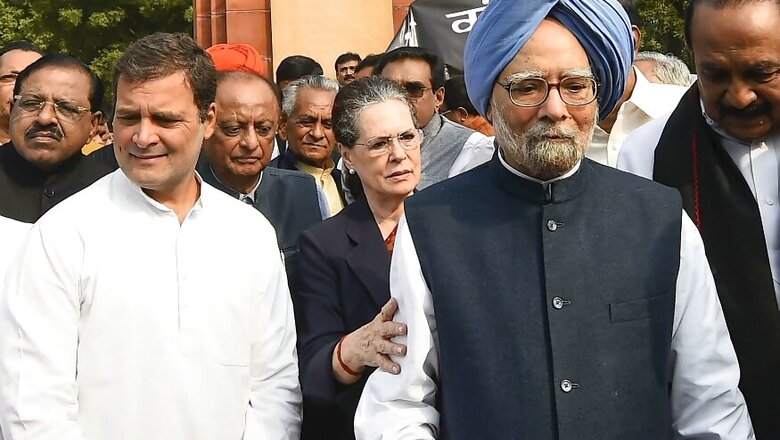
views
It is the proverbial storm in a teacup. Congress interim chief Sonia Gandhi’s move to appoint an 11-member consultative group to formulate the party's views on various issues of the day, is seen as a political barometer of ‘who is in and out’ of the hierarchy.
The absence of AK Antony, Ahmed Patel, Anand Sharma, Ghulam Nabi Azad, Adhir Ranjan Chowdhury and others is viewed as signs of loss of their clout and entry of Praveen Chakravarty, Gourav Vallabh, Supriya Shrinate and Rohan Gupta as a pointer towards birth of new influencers.
It may be noted that the panel has been set up to deal with the swirling COVID-19 situation on a daily basis. Thus, induction of Manmohan Singh, P Chidambaram, Manish Tewari, Jairam Ramesh, Randeep Singh Surjewala, Praveen Chakravarty, Gaurav Vallabh, Supriya Shrinate and Rohan Gupta can be explained in terms of their domain expertise in matters of economy, media and social media communication.
KC Venugopal is the lone AICC general secretary figuring in the panel. Being in-charge of organisational matters, his presence is perhaps for co-ordination purpose.
Interestingly, both Rohan Gupta and Supriya Shrinate are vying to draw Rahul Gandhi’s attention. Gupta, head of AICC’s social media team, fancies himself as another Prashant Kishor. He excels in social media, data analytics and research. Gupta is said to have managed Congress war rooms of the Madhya Pradesh, Jharkhand and Rajasthan Assembly elections.
He is considered close to Priyanka Gandhi and the Gujarat lobby in the Congress. In fact, in the Congress Working Committee meet on April 2, Gupta was the only non-CWC member who was part of it.
Shrinate, a Delhi-based former senior economic journalist was a prominent news anchor when in April 2019 she hurriedly quit television to contest as a Congress candidate from Uttar Pradesh's Maharajganj parliamentary constituency in the Lok Sabha polls. She belongs to a well-known Congress family in eastern Uttar Pradesh where her father Harshvardhan was a prominent figure.
In fact, Priyanka had taken a lead of sorts in inviting Shrinate to dabble in politics. Supriya Shrinate could not win her seat but her measured tone and understanding of politics-economics has earned her a place as AICC spokesperson.
Coming back to Sonia’s move to appoint a consultative panel, minutes after she went public with the announcement about the committee, which interestingly includes Rahul but omits Priyanka Gandhi, social media platforms and some mainstream media journalists started speculating if this marked the fading away of the likes of the seasoned Patel, Azad, Antony and Anand Sharma.
This postulation is flawed, exaggerated and attempts to take away focus from Sonia’s inability to resolve the leadership crisis in the Congress. In July 2019, she had ‘reluctantly’ accepted to be ‘interim’ AICC chief.
While taking over the responsibility, Sonia, who holds the distinction of being the longest-serving Congress president in the history of the 135-year-old organisation, had indicated a desire to hand over the leadership to someone else at the earliest. However, days, weeks and months have passed and there is no sign of any attempt to look for a new party chief.
Instead, Sonia has gone about spreading a “committee raj” in the party. On January 20 this year, she had appointed several panels in the party-ruled states of Madhya Pradesh (which slipped away within two months) Rajasthan, Chhattisgarh and the union territory of Pudducherry. For some unspecified reasons, Punjab was spared.
Coming at a time when the Congress should be holding organisational polls and looking for a full-time new party chief, announcement of these panels indicates that Rahul Gandhi’s induction as AICC president may take more time than expected.
It also tells, rather bluntly, that these panels do not serve any purpose. Madhya Pradesh makes a strong case for it. It proved to be a cruel joke at the expense of the party-ruled state when rootless wonders like Dipak Babaria, PL Punia, Mukul Wasnik and Avinash Pandey were tasked to enforce discipline and unity in Madhya Pradesh.
Instead, intra-party factionalism reached to a point of no return, resulting in Jyotiraditya Scindia’s defection and fall of the Kamal Nath regime. Sonia perhaps did not bother to check or Venugopal failed to record if any coordination panel meetings were held bringing Scindia, Nath and Digvijaya Singh face to face.
In retrospect, it appears that Scindia’s exit had a lot to do with the Gandhis' own failure to fulfil some of the informal promises that were made to him in 2018 and 2019 when Madhya Pradesh Assembly polls and Lok Sabha polls were contested.
At that point of time, Scindia was in high spirits, eager to lead from the front, but by the time poll results came out in December 2018, Rahul, Priyanka and Sonia tried to convince him, pointing out that age was in his side, and that a bigger role was in the offing.
Scindia was reportedly reluctant to contest the Lok Sabha polls from Guna as he was working full-time in Uttar Pradesh as AICC general secretary in-charge of UP west, but Rahul-Priyanka forced his hands.
The Gandhis reportedly advised him to let his wife Priyadarshini Raje campaign. Even son Mahnaaryaman was pressed into action. The duo drew good crowds but failed to convert them into votes. For the first time, a Scindia lost on the home turf.
Vijaya Raje Scindia too had lost but at Raebareli, Uttar Pradesh, against Indira Gandhi in 1980. Sources close to Jyotiraditya maintained that somewhere the Gwalior royal family scion held Rahul responsible for his defeat from Guna.
This point of view was based on the rather simplistic formulation that the 2019 Lok Sabha election was fought between Modi and Rahul where individual party nominees such as Jyotiraditya were inconsequential. Jyotiraditya believed that many of his supporters voted for Modi as he represented Rahul.
When the Delhi Assembly polls were round the corner, Sonia had named various panels drafting as many as 607 members in them. She is now known to administer pills for the party which are near expiry date. Sonia had three times turned to AK Antony to suggest means for revival of the Congress.
Antony panels, old-timers would recollect, were formed in 1999, 2008 and 2014 to deal with organisational issues. Each time, none of the findings and recommendations were either followed up or implemented. These reports are gathering dust at 24, Akbar Road.


















Comments
0 comment